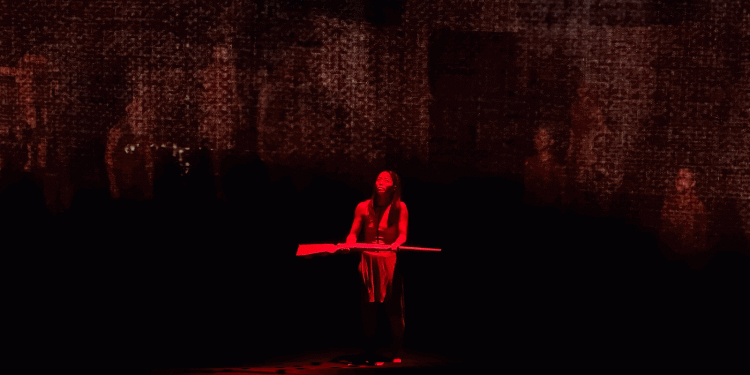Akram Khan’s Jungle Book Reimagined shown at the Kote Marjanishvili State Drama Theater as a final of the Tbilisi International Festival of Theater 2024 brought a fresh yet contentious perspective to Rudyard Kipling’s classic tale. Through a contemporary lens, Khan and his diverse ensemble of international dancers reinterpret the journey of Mowgli, framing it within the context of a climate refugee’s plight. While the production showcases stunning choreography, catchy animation, and an original score, it also grapples with the weight of colonial narratives embedded in its source material.
A Colonial Legacy Under Scrutiny
Kipling’s original text, often criticized for its colonial undertones, finds itself in a precarious position when reinterpreted by Akram Khan. His decision to adapt not only Kipling’s story but also the Disney animation raises questions about the implications of revisiting colonial narratives. The performers, diverse in appearance yet frequently cast in the roles of jungle animals, challenge the expectations of representation, but risk perpetuating stereotypes inherent in the original story.
Khan’s reinterpretation introduces a female Mowgli, aligning with contemporary feminist ideals. However, this decision, while progressive, brings forth its own complexities. The character of Kaa is reimagined as a representation of environmentally damaging packaging, intertwining themes of feminism and climate awareness. This bold artistic choice aims to connect the narrative to modern environmental issues, yet it risks oversimplifying the intricate relationship between gender, colonialism, and ecological crises. The challenge lies in ensuring that such interpretations do not dilute the seriousness of the themes at play.
A Dance-Theatre Experience: Movement vs. Meaning
As a dance-theatre production, Jungle Book Reimagined showcases the remarkable physicality of its cast, known for their capacity to execute breathtaking movements. However, the portrayal of animals, especially the dancers mimicking monkeys, occasionally veers into the realm of caricature rather than genuine artistic expression. While the choreography is technically impressive, the animalistic representation lacks a cohesive narrative thread, leaving audiences to question the effectiveness of such portrayals in conveying deeper messages.
The performance incorporates spoken word elements from Kipling’s text, yet the delivery feels overly dramatic, reducing the potential impact of the words themselves. In a similar vein, the score by Jocelyn Pook, though aiming for an evocative soundscape, often appears as a superficial attempt to evoke Indian musical traditions without offering a genuine connection to the culture. This can leave audiences longing for a more authentic auditory experience that aligns with the visual spectacle on stage.
The Risks of Superficial Engagement
In an age where social issues are increasingly woven into artistic narratives, Jungle Book Reimagined illustrates the challenges of balancing engagement with depth. Khan’s production, while visually striking and ambitious, sometimes flirts with the superficiality of its thematic explorations. The desire to address pressing issues like climate change and gender identity, although noble, raises concerns about whether these themes are fully realized or merely surface-level statements that risk alienating audiences rather than resonating with them.
As contemporary movements gain momentum, the pressure on artists to engage with these topics can lead to a dilution of their essence. Khan’s attempt to marry these modern concerns with a beloved classic brings forth a relevant discourse but also highlights the potential pitfalls of appropriating historical texts for contemporary commentary without a thorough investigation of their complexities.
Ultimately, Akram Khan’s Jungle Book Reimagined stands as an ambitious attempt to bridge the gap between colonial narratives and contemporary issues. While the production dazzles with its choreography and visual elements, it invites scrutiny regarding its engagement with the themes it seeks to explore. As audiences reflect on Mowgli’s journey through this reimagined lens, they are reminded of the importance of depth and nuance in tackling complex narratives—both in the jungle and beyond.
Review by Ivan Nechaev














